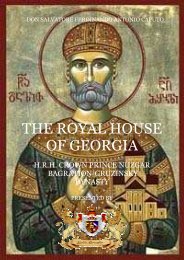here - Nobility Associations
here - Nobility Associations
here - Nobility Associations
Create successful ePaper yourself
Turn your PDF publications into a flip-book with our unique Google optimized e-Paper software.
and Teutonic Knights. In 1217 Frederick II Hohenstaufen granted the Teutonic<br />
Knights the same status as the Templars and Hospitallers in the Kingdom of Sicily.<br />
In 1220 Pope Honorius III gave privileges to the Teutonic Knights; as an order,<br />
they now were on the same level as the Templars and the Hospitallers. In 1226 the<br />
"Golden Bull of Rimini" from Frederick II for the Teutonic Knights giving them<br />
wide-ranging authority in the name of the empire in Prussia. In 1319 the Teutonic<br />
Knights' headquarters moved from Venice to Prussia. In 1410 Lithuanian-Polish<br />
forces defeated the Teutonic Knights at the Battle of Tannenberg, Prussia, halting<br />
the Teutonic Knights’ eastward expansion along the Baltic and hastening their<br />
decline.<br />
The Hospitallers later retreated from Islamic forces to Cyprus, Rhodes, various<br />
Italian towns, In 1530 Pope Clement VII (1478-1534) granted them perpetual fief of<br />
the Island of Malta for annual rent of a falcon. The Knights of Malta eventually<br />
surrendered to Napoleon Bonaparte (1769-1821) in 1798 and disbanded.<br />
The Hautville (Altavilla) Dynasty – Founder of Antioch<br />
Bohemond I of Antioch was one of the most fascinating<br />
and controversial figures of the First Crusade. He was<br />
originally the prince of Otranto, but in the wake of the<br />
conquest of Antioch during the First Crusade he took<br />
control of the city and became known as Bohemond of<br />
Antioch.<br />
Bohemond I, also spelled Bohemund or Boamund,<br />
(c. 1058 – 3 March 1111), Prince of Taranto Prince of<br />
Antioch, was one of the leaders of the First Crusade as he<br />
led the whole Crusader army until the conquest<br />
of Antioch.<br />
Bohemond was born in San Marco Argentano, Calabria,<br />
as the eldest son of the Norman Robert Guiscard, Duke of Apulia and Calabria, and<br />
his first wife Alberada of Buonalbergo. He was christened "Mark" at his baptism,<br />
but was nicknamed Bohemond (after the legendary giant Buamundus gigas), by<br />
his father due to his size as an infant.<br />
The Norman monarchy he found in Antioch survived those in both England and<br />
Sicily.<br />
Son of Robert who, encouraged by his dad, developed seriously wider geographic<br />
ambitions than Puglia, and had a go early on at subduing Greece on his way to<br />
doing the same to Constantinople. However this failed and it was to be the 90s<br />
The Hohenstaufen Dynasty - Page 113 of 200



